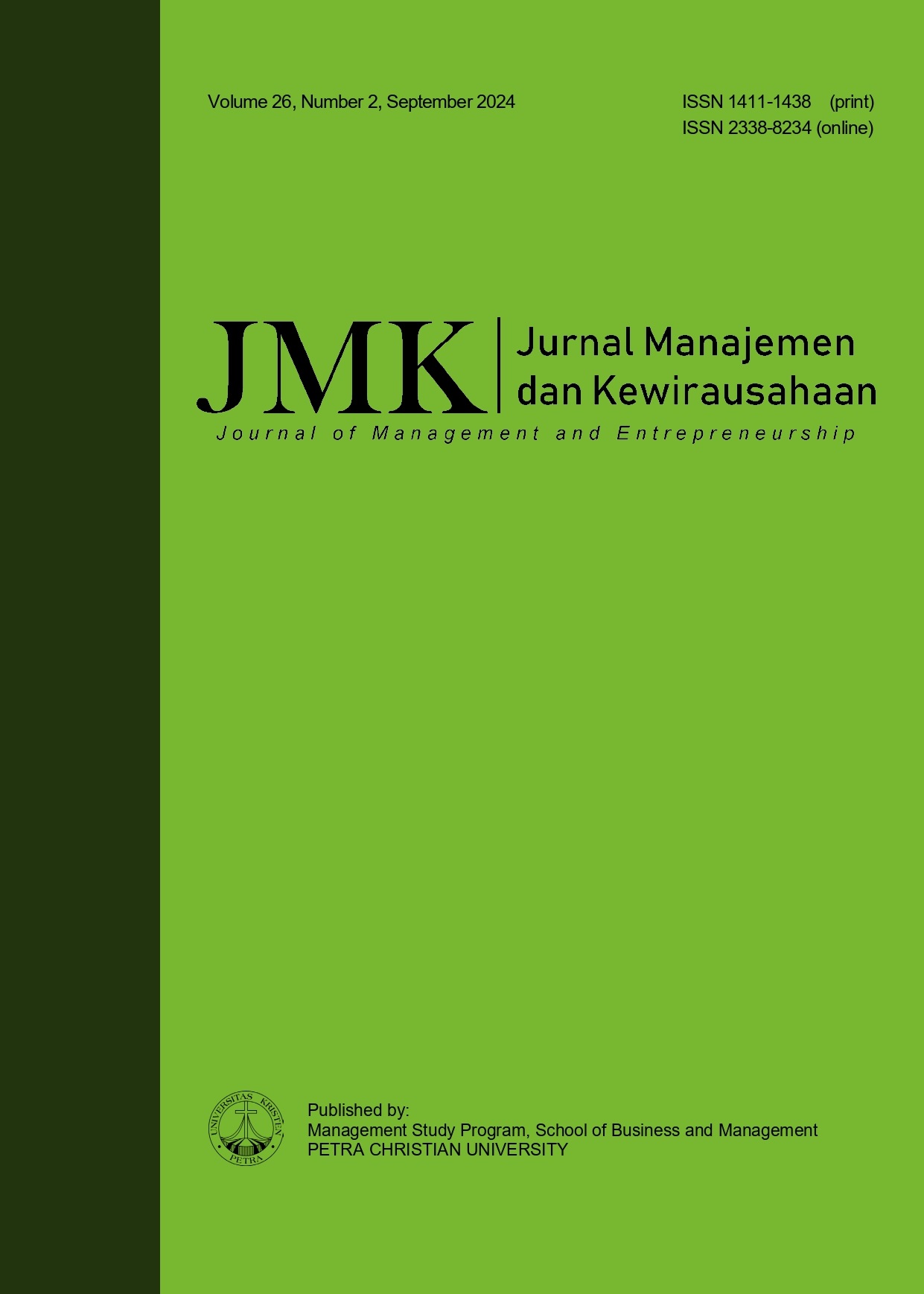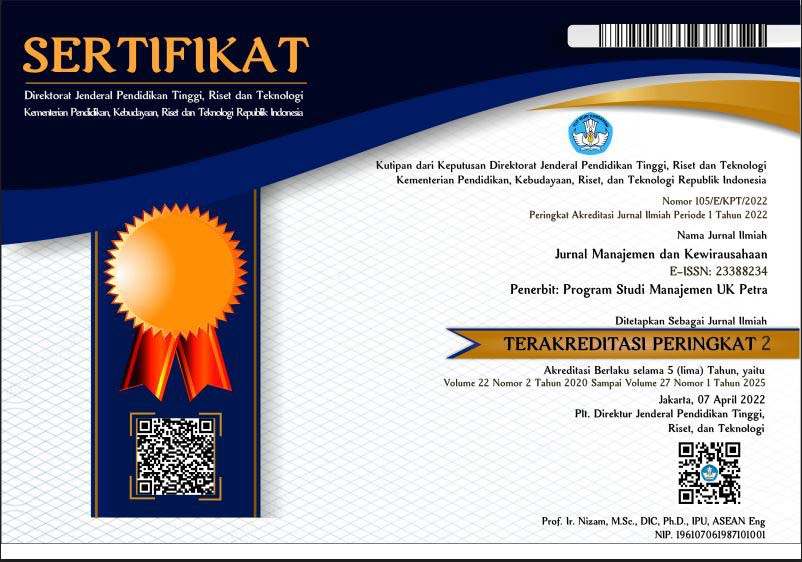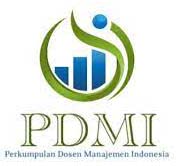COPING WITH FOURTH INDUSTRIAL REVOLUTION CHALLENGES: LEADERSHIP COMPETENCIES IN THE AIRLINE INDUSTRY
DOI:
https://doi.org/10.9744/jmk.26.2.125-134Keywords:
Leadership competencies, fourth industrial challenges, leadership framework, successAbstract
This study aimed to identify leadership competencies crucial for navigating the Fourth Industrial Revolution in the airline sector, utilizing a mixed-method approach, specifically an explanatory sequential design. Data from 210 employees underwent analysis using descriptive and inferential statistics, predictive analytics, and bootstrapping methods. Findings indicated that while age and education had no bearing on leadership competencies, gender, tenure, and positions displayed variations, indicating competency enhancements regardless of demographics. Furthermore, all competencies studied significantly predicted overall success, with some explicitly influencing challenges associated with the Fourth Industrial Revolution. A proposed leadership development framework addressed the findings precisely challenges, with practical implications focusing on driving success and sustainability in the airline industry.
References
US Senate Committee on Commerce, Science, and Transportation. (2020). The state of the aviation industry: Examining the impact of the COVID-19 pandemic. https://www.commerce.senate.gov/2020/5/the-state-of-the-aviation-industry-examining-the-impact-of-the-covid-19-pandemic
Asia Pacific Economic Cooperation. (2020). Philippine aviation in the time of the COVID-19 pandemic. Retrieved from https://mddb.apec.org/Documents/2020/TPTWG/TPTWG49-AEG/20_tptwg49_aeg_007.pdf
Butler-Adam, J. (2018). The fourth industrial revolution and education. Academy of Science of South Africa, 114(5/6), 1–1. https://doi.org/10.17159/sajs.20 18/a0271
Chitturu, S., Lin, D.Y., Sneader, K., Tonby, O., & Woetzel, J. (2017). Artificial intelligence and Southeast Asia’s future. Retrieved from https://www.mckinsey.com/~/media/McKinsey/Featured%20Insights/Artificial-intelligence-and-Southeast-Asias-future.pdf
Dadios, E. P., Culaba, A. B., Albert, J. R. G., Paqueo, V. B., Orbeta Jr., A. C., Serafica, R. B., Bandala, A. A., & Bairan, J. C. A. C. (2018). Preparing the Philippines for the fourth industrial revolution: A scoping study. PIDS Discussion Paper Series No. 2018-11. Retrieved December 11, 2019 from https://pidswebs.pids.gov.ph/CDN/PUBLICATIONS/pidsdps1811.pdf.
Fernández-Miranda, S. S., Marcos, M., Peralta, M. E., & Aguayo, F. (2017). The challenge of integrating Industry in the degree of Mechanical Engineering. Procedia Manufacturing, 13, 1229–1236. https://doi.org/10.1016/j. promfg.2017.09.039
Francisco, J. P., Flores, S. R., Canare, T., Caboverde, C. E., Borja, B. E., & Monterola, C. (2019). Mapping Philippine workers at risk of automation in the Fourth Industrial Revolution. SSRN Electronic Journal. http://dx.doi.org/10.2139/ssrn.3366809
Fuller, M. (2019). Big data and the Facebook scandal: Issues and responses. Theology, 122(1), 14–21. https://doi.org/10.1177/0040571X18805908
Giles, T. (2015). Cybersecurity index beat S&P 500 by 120%: Here’s why, in charts. The Wall Street Journal. Retrieved from https://www.wsj.com/articles/BL-MBB-41234
Grzybowska, K., & Lupicka, A. (2017). Key com-petencies for Industry 4.0. Economics and Management Innovations, 1(1), 250–253.
Herold, G. (2016). Leadership in the Fourth Industrial Revolution. Retrieved from https://executiveacademy.at/fileadmin_synced_assets/documents/White_Papers/Leadership-in-Fourth-Industrial -Revolution-Stanton-Chase.pdf
Hunter, C. (2018). Sharpen your decision-making and problem-solving skills. Durban: Sherwood Books.
Ieva, A. (2015). The structure of socio-cultural competence: Self-development. Vocational Training Research and Realities, 26(1), 94–105. http://dx.doi .org/10.1515/vtrr-2015-0006
Kumar, K., Zindani, D., & Davim, J. P. (2019). Industry 4.0: Developments towards the fourth industrial revolution. Singapore: Springer.
Kunafei, M. A., Arifin, I., & Sultoni. (2019). The implementation urgency of conflict management in educational organization for industrial revolution era 4.0. Advances in Social Science, Edu-cation, and Humanities Research, 382, 575–579.
Larsson, G., Carlstedt, L., Andersson, J., Andersson, L., Danielsson, E., Johansson, A., Johansson, E., Michel, P. O., & Robertson, I. (2003). A comprehensive system for leader evaluation and development. Leadership and Organization Development Journal, 24(1), 16–25. http://dx.doi.org/10.1108/014 37730310457294
Larsson, G., & Hyllengren, P. (2013). Contextual influences on leadership: Theoretical modelling and empirical tests. International Journal of Organizational Analysis, 21(1), 19–37. http://dx .doi.org/10.1108/19348831311322515
Lee, S. M., & Wong, C. (2019). The impact of conflict management styles on leader-member exchange: The moderating role of proactive personality. International Journal of Conflict Management, 30(2), 228–249.
Leurent, H., & Shook, E. (2019). Leading through the 4th industrial revolution: Putting people at the centre. World Economic Forum, White Paper, (January), 1–25. Accenture. https://www3.weforum.org/docs/WEF_Leading_through_the_Fourth_Industrial_Revolution.pdf
Madanchian, M., Hussein, N., Noordin, F., & Taherdoost, H. (2017). Leadership effectiveness measurement and its effect on organization out-comes. Procedia Engineering, 181, 1043–1048. https://doi.org/10.1016/j.proeng.2017.02.505
Manda, M., & Backhouse, J. (2016). Addressing trust, security and privacy concerns in e-government integration, interoperability and information sharing through policy: A case of South Africa. Proceedings of the 2016 International Conference on Information Resources Management (CONF-IRM). Paper 67.
Manda, M., & Dhaou, S. (2019). Responding to the challenges and opportunities in the 4th industrial revolution in developing countries. Presented in Association of Computing Machinery, 12th International Conference on Theory and Practice of Electronic Governance, Australia.
Meraku, A. (2017). Role of leadership in organizational effectiveness. Journal of Economics, Business and Management, 5(11), 336–340. https://doi.org/10.18178/joebm.2017.5.11.535
Morgan, J. (2014). The future of work: Attract new talent, build better leaders, and create a competitive organization. Hoboken, NJ: John Wiley and Sons.
Murphy, T., Garg, S., Sniderman, B., & Bu¬ckley, N. (2019). Ethical technology use in the fourth industrial revolution. Retrieved from https://www2.deloitte.com/content/dam/insights/us/articles/6275_Ethical-technology/DI_Ethical-technology-use-in-the-Fourth-Industrial-Revolution.pdf
Oberer, B., & Erkollar, A. (2018). Leadership 4.0: Digital leaders in the age of industry 4.0. Inter-national Journal of Organizational Leadership, 1–9. Available at SSRN: https://ssrn.com/abstract=3337644
OECD. (2016). Innovating education and educating for innovation: The power of digital technology and skills. Paris: OECD Publishing. Retrieved from https://www.oecd.org/education/ceri/GEIS2016-Background-document. pdf
Pedersen, C. L., & Ritter, T. (2021). The 4 types of leadership. Haas School of Business. Retrieved from https://cmr.berkeley.edu/2021/01/the-4-types-of-leadership/
Philbeck, T., Davis, N., & Larsen, A. M. E. (2018). Values, ethics, and innovation: Rethinking technological development in the fourth industrial revolution. Retrieved from https://www3.weforum.org/docs/WEF_WP_Values_Ethics_Innovation_2018.pdf
Pineda, A. P. M. (2013). Total quality management in educational institution: Influences on customer satisfaction. Asian Journal of Management Sciences and Education, 2(3), 31–46.
Plutschinski, T. (2017). The 4th industrial revolution from an ethical perspective. ISPSW Strategy Series: Focus on Defense and International Security, 516.
Relich, M. (2015). Identifying relationships between eco-innovation and product success. In P. Golińska, & A. Kawa, (Eds.), Technology management for sustainable production and logistics (pp. 173–192). Berlin, Heidelberg: Springer. https://doi.org/10.1007/978 -3-642-33935-6_9
Robinson, R. S. (2014). Purposive sampling. In A. C. Michalos (Ed.), Encyclopedia of quality of life and well-being research, 5243–5245. https://doi.org/10.1007/978-94-007-0753-5_2337
Rychen, D. (2016). Education conceptual framework 2030: Key competencies for 2030 (DeSeCo 2.0). Retrieved from http://www.oecd.org/education/ 2030-project/about/documents/E2030-CONCEPTUAL-FRAMEWORK-KEY-COMPETENCIES-FOR-2030 .pdf
Schwab, K. (2016). The Fourth Industrial Revolution: What it means, how to respond. Retrieved from https://www. weforum.org/agenda/2016/01/
Segal, A. (2017). Conflict resolution in the fourth industrial revolution. Retrieved from https://
www.bbvaopenmind.com/en/technology/robotics/conflict-resolution-in-the-fourth-industrial-revolution/
Senko, K. (2018). Core leadership competencies for the airline captain. Retrieved from https://www.linkedin.com/pulse/core-leadership-competencies-airline-captain-katherine-senko/
Skilton, M., & Hovsepian, F. (2018). The 4th industrial revolution: Responding to the impact of artificial intelligence on business. Palgrave Macmillan. https:// doi.org/10.1007/978-3-319-62479-2
Slegel, E. (2013). Socio-cultural intelligence: The effect of socio-cultural information on intelligence estimates. Mercyhurst College (Erie, Pa.) Graduate Program in Applied Intelligence. Retrieved from https://ezborrow.reshare.indexdata.com/Record/2543c2dc-a0c1-4949-a44d-306c9d29d7f9/descrip tion#tabnav
Sobieralski, J. B. (2020). COVID-19 and airline employment: Insights from historical uncertainty shocks to the industry. Transportation Research Interdisciplinary Perspectives, 5, 100123. https://doi.org/10.1016/j.trip.2020.10 0123
Soni, P. (2019). Redefining leadership for the fourth industrial revolution. Mancosa News. Retrieved from mancosa.co.za
Suau-Sanchez, P., Voltes-Dorta, A., & Cugueró-Escofet, N. (2020). An early assessment of the impact of COVID-19 on air transport: Just another crisis or the end of aviation as we know it? Journal of Transport Geography, 86, 102749. https://doi.org/10.1016/j.jtra ngeo.2020.102749
Sun, Z. (2018). Innovation and entrepreneurship in the fourth industrial revolution. Presented in Joint Workshop on Entrepreneurship, Lae, PNG, 18 July 2018. http://dx.doi.org/10.13140/RG.2.2.28929.97127
Verwey, S. (2018). Fourth industrial revolution – Beyond competencies. Retrieved from https://www.uj.ac.za/wp-content/uploads/2021/09/1-4th-ir-beyond-competencies_final-20190924. pdf.
Weyer, S., Schmitt, M., Ohmer, M., & Gorecky, D. (2015). Towards Industry 4.0 standardization as the crucial challenge for highly modular, multi-vendor production systems. IFAC-PapersOnline, 48(3), 579–584. https://doi.org/10.1016/j.ifacol.2015.06.143
World Economic Forum. (2016). The future of jobs: Employment, skills and workforce strategy for the fourth industrial revolution. Retrieved from https://www3.weforum.org/docs/WEF_Future_of_Jobs.pdf
Xu, M., David, J. M., & Kim, S. H. (2018). The fourth industrial revolution: Opportunities and challenges. International Journal of Financial Research, 9(2), 90–95. https://doi.org/10.5430/ijfr.v9n2p90
Zakaria, N., Nasir, A., & Akhtar, A. (2019). Are leaders ready to embrace industry 4.0? Journal of Advanced Research in Dynamical and Control Systems, 11 (5), 543–549.
Downloads
Published
How to Cite
Issue
Section
License
Copyright (c) 2024 Edmond Paolo Garcia

This work is licensed under a Creative Commons Attribution 4.0 International License.
Authors who publish on this journal agree to the following terms:
- Authors retain copyright and grant the journal right of first publication with the work simultaneously licensed under a Creative Commons Attribution License that allows others to share the work with an acknowledgement of the work's authorship and initial publication in this journal.
- Authors are able to enter into separate, additional contractual arrangements for the non-exclusive distribution of the journal's published version of the work (e.g., post it to an institutional repository or publish it in a book), with an acknowledgement of its initial publication in this journal.
- Authors are permitted and encouraged to post their work online (e.g., in institutional repositories or on their website) prior to and during the submission process, as it can lead to productive exchanges, as well as earlier and greater citation of published work (See The Effect of Open Access).


















